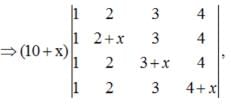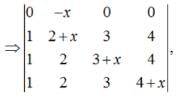JEE Exam > JEE Tests > Mathematics (Maths) Class 12 > Test: Determinants - 2 - JEE MCQ
Test: Determinants - 2 - JEE MCQ
Test Description
25 Questions MCQ Test Mathematics (Maths) Class 12 - Test: Determinants - 2
Test: Determinants - 2 for JEE 2025 is part of Mathematics (Maths) Class 12 preparation. The Test: Determinants - 2 questions and answers have been
prepared according to the JEE exam syllabus.The Test: Determinants - 2 MCQs are made for JEE 2025 Exam. Find important
definitions, questions, notes, meanings, examples, exercises, MCQs and online tests for Test: Determinants - 2 below.
Solutions of Test: Determinants - 2 questions in English are available as part of our Mathematics (Maths) Class 12 for JEE & Test: Determinants - 2 solutions in
Hindi for Mathematics (Maths) Class 12 course. Download more important topics, notes, lectures and mock
test series for JEE Exam by signing up for free. Attempt Test: Determinants - 2 | 25 questions in 25 minutes | Mock test for JEE preparation | Free important questions MCQ to study Mathematics (Maths) Class 12 for JEE Exam | Download free PDF with solutions
Detailed Solution for Test: Determinants - 2 - Question 1
Detailed Solution for Test: Determinants - 2 - Question 2
Detailed Solution for Test: Determinants - 2 - Question 3
Test: Determinants - 2 - Question 4
If the order of matrix A is m*p. And the order of B is p×n. Then the order of matrix AB is ?
Test: Determinants - 2 - Question 5
If each element of a 3 × 3 matrix A is multiplied by 3 , then the determinant of the newly formed matrix is
Detailed Solution for Test: Determinants - 2 - Question 6
Detailed Solution for Test: Determinants - 2 - Question 7
Detailed Solution for Test: Determinants - 2 - Question 8
Detailed Solution for Test: Determinants - 2 - Question 9
Test: Determinants - 2 - Question 10
If A is a non singular matrix of order 3 , then |adj(adjA)|
Detailed Solution for Test: Determinants - 2 - Question 10
Detailed Solution for Test: Determinants - 2 - Question 11
Detailed Solution for Test: Determinants - 2 - Question 12
Detailed Solution for Test: Determinants - 2 - Question 13
Test: Determinants - 2 - Question 14
If A is a non singular matrix and A’ denotes the transpose of A , then
Detailed Solution for Test: Determinants - 2 - Question 14
Detailed Solution for Test: Determinants - 2 - Question 15
Test: Determinants - 2 - Question 16
If A ,B andC be the three square matrices such that A = B + C , then Det A is equal to
Detailed Solution for Test: Determinants - 2 - Question 16
Detailed Solution for Test: Determinants - 2 - Question 17
Detailed Solution for Test: Determinants - 2 - Question 18
Test: Determinants - 2 - Question 19
If A and B are square matrices of order 3 , such that Det.A = –1 , Det.B = 3 then the determinant of 3AB is equal to
Detailed Solution for Test: Determinants - 2 - Question 19
Detailed Solution for Test: Determinants - 2 - Question 20
Detailed Solution for Test: Determinants - 2 - Question 21
Detailed Solution for Test: Determinants - 2 - Question 22
Detailed Solution for Test: Determinants - 2 - Question 23
Test: Determinants - 2 - Question 24
The system AX = B of n equations in n unknowns has infinitely many solutions if
Detailed Solution for Test: Determinants - 2 - Question 24
Test: Determinants - 2 - Question 25
If A is a square matrix such that A3 = I , then A−1 is equal to
Detailed Solution for Test: Determinants - 2 - Question 25
|
204 videos|290 docs|139 tests
|
Information about Test: Determinants - 2 Page
In this test you can find the Exam questions for Test: Determinants - 2 solved & explained in the simplest way possible.
Besides giving Questions and answers for Test: Determinants - 2, EduRev gives you an ample number of Online tests for practice




 , then
, then  is equal to
is equal to 



















 is equal to
is equal to 

 is
is

 has value
has value




















